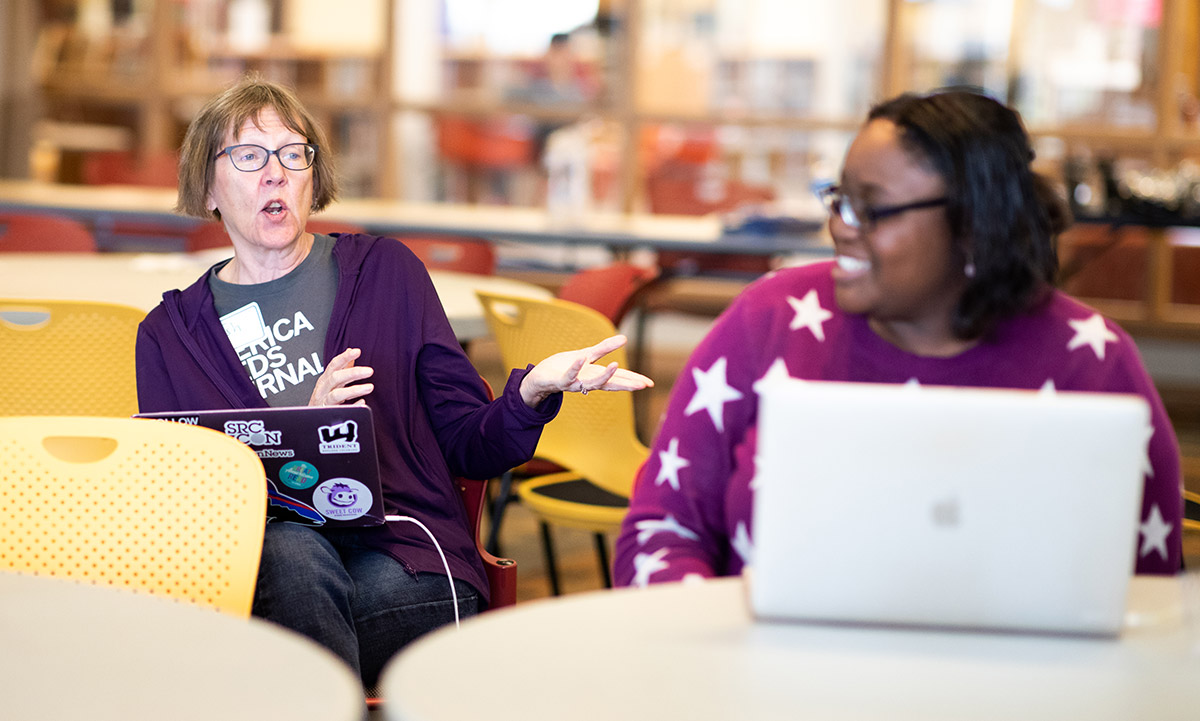Peer support for local journalists working on data stories
by Ryan Pitts

Talking through ideas with a peer can help you find your way forward. (Photo: Alyson McClaran for Colorado Media Project)
We’re excited to announce a new project today: a peer-review program that connects people in smaller newsrooms with fellow journalists who can help them think through a data project. If you have a folder full of great data but no experienced colleagues to help you take the next step toward making it a story, this is for you!
Tell us about your data and what you hope to do with it, and we’ll do our best to pair you up with a peer coach who’s worked through similar projects. Your request and story idea will stay private, and we have an awesome group of volunteers ready to help out.
How this program works
Peer coaches will be experienced data journalists who can look over data with you, help confirm your hunches, and identify things you might have overlooked. You bring the data and an idea, and they’ll set up a conversation to work through the questions you have.
Participation is free and designed for data journalists on small teams, from local or regional newsrooms, and from underrepresented backgrounds in journalism. Applications will be open through Oct. 16. To get started:
- Use this form to tell us about your project.
- OpenNews will review requests and reach out to coaches to see who can help. We can’t promise that someone will be available to work with you, but we’ll let you know either way.
- If there’s a coach who’s a good fit for your project, they’ll reach out with some followup questions. You’ll probably trade a few emails back and forth.
- Coaches will set aside time for a call so you can dig into your project together.
- We’ll follow up to ask how things went.
Where this program came from
Conversations with local journalists identified this need. This program is an experiment that’s emerging from dozens of conversations we’ve had over the past year. We’ve talked with folks at NICAR and ONA, at a convening we brought together in Denver, in Slack chats and email threads, and at this summer’s Data Institute. Local journalists are using data to tell important stories for their communities, but we’ve heard a lot of versions of the same worry: What do you do when you don’t have experienced colleagues or editors who can doublecheck your work? That’s not a skills gap, it’s a support gap.
One of the hardest things to overcome on the way to publishing a data story is that nagging feeling that oh no, what if my math is wrong. Sometimes a nudge in the right direction or a bit of confirmation is all it takes, or sometimes you need a bit of redirection to avoid mistakes. If you don’t have someone with the experience to give you that feedback—a situation that’s all too common in shrinking local newsrooms—it’s hard to feel confident enough to put your byline on a story. So that data just sits there in a spreadsheet, somewhere on your hard drive, promising all sorts of great stories … someday.
We learn best when we learn from peers. Many of those same conversations also underlined the role that peer sharing plays in elevating journalism throughout this community. It’s easier to apply what you learn from someone who knows how reporting and analysis and ethics and deadlines fit together, and where the roadblocks usually show up.
There are all sorts of amazing ways we as a community teach each other the techniques of data journalism, from conferences and community events to trainings to writeups. The additional step this program takes—providing one-on-one support in using those skills on a real project with real data in all its ugly glory—is something that also happens, just far more informally. For smaller teams, it’s usually when people have a friend in another newsroom they feel comfortable asking for help. We want to make that kind of support visible and accessible to everyone.
This community organizes itself around sharing. We’re consistently amazed at how often journalists in this community reach out looking for opportunities to help someone else get better at their craft or move ahead in their career. (Seriously, people thank us when we ask them if they might be interested in volunteering. It’s amazing! And more than a little humbling.)
One great example: We offered peer coaching for SRCCON facilitators for the first time a couple years ago, thanks to suggestions from a couple community members. We created some light structure for conversations with experienced session leaders, and the people who took part found it incredibly helpful. This year about half our sessions participated in peer coaching, and facilitators told us about everything from agenda tweaks to wholesale changes in direction they made thanks to conversations with someone who’d been there before. All those instances of one-on-one support made a huge difference in what this community was able to create together.
Finding a framework for peer data review
When we started thinking about how to structure this new data-review program, we knew we’d stay rooted in volunteer support and knowledge-sharing. Our experience from SRCCON and the conversations we’ve had with local journalists gave us the roadmap we want to follow: We’ll try this on a small scale first, figure out with the community what kind of structure works best, then decide how we can organize resources like this to help the most people.
The data-review program is an experiment, and we want to be really upfront about that. We know there’s a need, because we’ve been hearing local journalists name it. We know there’s enough experience and generosity to meet that need, because this kind of knowledge-sharing already happens, and more people keep raising their hands to help. This is about making that help more accessible. We think there’s a sustainable, public framework for peer support, one that could pull a ton of local data stories out of hidden spreadsheets, archived PDFs, and scrappy little scrapers. The next several weeks are going to teach us a lot about making it work.
If you’re part of a small team or a local newsroom and you could use some advice on a data story you’re working on, tell us about it!
The latest from the OpenNews team
Our next step in community-driven leadership: an Advisory Council
Read all our news in our OpenNews blog

